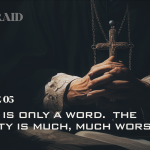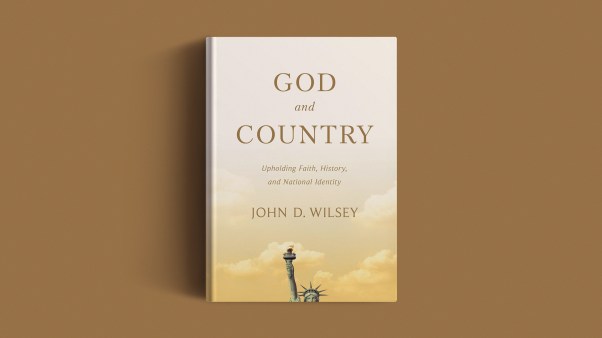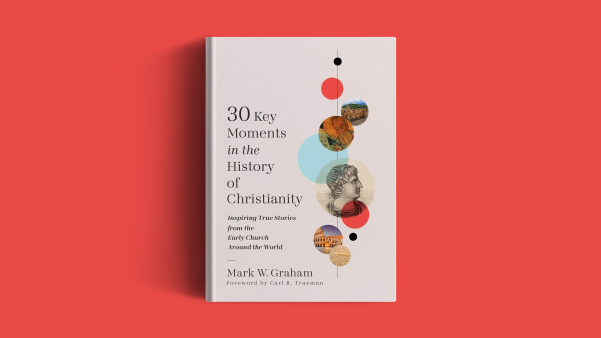Saying you believe in Bigfoot is sure to get a laugh, especially in Christian circles. It’s like saying you believe in the boogeyman or the Easter Bunny—just too crazy.
But the Bible routinely tells stories that could fairly be characterized as paranormal, supernatural, or in some way beyond the realm of human understanding. And beyond the more familiar miracles, Scripture includes strange and murky stories: Who are the Nephilim described in Genesis 6? Are the other gods the Israelites too often worship in the Old Testament real beings or simply idols of their own making? Exactly who or what are the “spiritual forces of evil in the heavenly realms” of Ephesians 6?
Reading these stories as a modern Westerner, I’ve tended to take the least mystical, least crazy-sounding interpretation on offer. But a year ago, my brother introduced me to a podcast that challenged my assumptions from a distinctly Christian perspective.
Nate Henry and Luke Rodgers are the creators and hosts of Blurry Creatures. They love Jesus and have spent the last five years digging into supernatural stories in the Bible, as well as present-day paranormal experiences. They spoke to me about their faith, work, and goals for the podcast.
This interview has been edited and condensed.
For those Christianity Today readers who aren’t familiar with the Blurry Creatures podcast, tell us a little bit about the show, its origin, and the topics you cover.
Luke Rodgers: There’s a lot of paranormal conversations and a lot of paranormal podcasts out there. There’s a lot of things that happen. People experience; people see things. These also become trending topics in mainstream media—things like UFOs and aliens or the Bigfoot phenomenon.
There are a lot of spaces out in the ether where people talk about these things, but the church itself doesn’t address a lot of them. What we’ve created is a platform where we talk about weird things that people experience and weird things in the Bible—but all from a biblical worldview.
Our mission is really to find better answers for the unexplained and to do that through a biblical perspective. And it’s our belief that our faith has big-enough fences. There’s enough in the Bible to provide better answers for a lot of the things we don’t have answers for.
When we started this podcast, the first episode was on Bigfoot. That was where we began. It’s the gateway drug. It’s the most-seen cryptid. Everyone’s familiar with it—it’s Americana at this point. But what do we do with this thing that people see?
The biblical scholar Michael Heiser, whom we had in episode 34, his book The Unseen Realm has been a seminal piece of the worldview that we talk about in this show. And his whole thing was, there’s this unseen realm. Our faith is very supernatural. There’s a supernatural aspect to our faith—it’s in the Bible.
What Heiser said in our show was that if just one of those thousands of Bigfoot accounts every year is true, then it breaks the paradigm, and you have to figure out a way to make space within your understanding of reality for this creature—or for the UFO phenomena or for better understanding of demonology and angels.
So our goal is to have conversations—to have more academic conversations, talk to the experts who have spent 10,000 hours on their subjects—and discuss something that’s very niche in a lot of ways but also something that’s very relevant to being a Christian. We have a very supernatural faith, and our thing is trying to put the supernatural back into our Christian faith and talk about weird stuff within that context. We hope that people come for the weird conversations and the weird stuff in the Bible and, whether they’re believers or not, that they have an encounter with the gospel inside of all of this weirdness.
Nate Henry: Yeah, Luke and I had been in rabbit holes of Bigfoot and giants and Nephilim and ghosts—paranormal stuff. He had a sighting in a cemetery when he was younger. I saw something as a kid that I couldn’t explain. And then when I was about 30 years old, I got really into listening to stories about Bigfoot.
We grew up in the church, and a lot of the other shows about this stuff don’t really give you answers. They just kind of stay in the spooky and the weird. And I thought, well … As a Christian, I think there should be some sort of answer to these things. So maybe we can marry these two things: the paranormal conversation and the theological conversation. Kind of put them together—and the Bible has all that in there already, but the church seems to tiptoe around it or not really give you a data-driven perspective on this stuff that people are experiencing.
What we’ve found is over the years that people of all walks of life have a story or three, sometimes a lot of stories they can’t explain, and they’ve found there aren’t many people they can talk to about these things, especially in the church. But I think we Christians should be the most open-minded to this stuff.
It’s interesting how God took me to this more theological route—those Bigfoot stories I’d been listening to didn’t have a Christian perspective. But I realized there’s this Christian overlap here and thought, Someone needs to have a podcast about this. So we got started in 2019, and the name Blurry Creatures came out of the frustration of whenever there’s a photo of a cryptid, it’s blurry.
God’s done a few things in my life where it’s like I get this flash of a vision, almost, that I don’t even understand, and then later it all makes sense. And I think in the last few years, now that we’re doing this full-time, it’s cool to look back and feel like that’s what happened here. It feels like a confirmation. This has become a lot more than I anticipated. It’s been a moment to trust God and see what happens.
Rodgers: We didn’t even have a website until episode 30. We didn’t come out of the gate with a polished show and a way for listeners to support us. We didn’t know whether anyone would listen to this. But these were the fun conversations we wanted to have, and by about episode 30, people were reaching out, saying, “We can’t find your website.” “Do you guys have any T-shirts for sale?” We didn’t know what was happening. Nate had wanted it to grow, but it wasn’t like we architected that.
I’ve started companies before, but I’ve never had a project where I felt like God was so involved that it seemed like he was kind of moving it. We didn’t have to push the ball up the hill every day. There’s a ton of work involved, but it has just kind of taken off.
Part of that is we had such great timing—we got going right before 2020, when everyone had their paradigms broken in a lot of ways. And then people started saying, “Well, what are we meant to believe? What do we think about all these things now?” And then 2022 comes along, and we’re like, Should we talk about aliens? I really didn’t want to. But this became mainstream, so we decided to talk about how you contextualize things like aliens if you’re a Christian. We started talking more about the Bible, and we were like, We’re kind of like Christians in a band, not a Christian band, but this is who we are, so let’s lean into this.
Henry: We didn’t market ourselves as a Christian podcast as much as it was a creatures podcast with two Christian hosts, if that makes sense.
And I don’t think we want it to be cheesy. And there’s a lot of Christian media that’s marketed badly. It’s cheesy. It’s kind of PG. And the conversations we have are not PG. They’re about hardcore, weird, strange stuff—like a Christian saying, “I’m an alien abductee, and I believe in Jesus, but I also have this stuff that comes and takes me out the window every night.” And it’s like, Okay, what do I do with that?
Your podcast doesn’t claim to be systematic or biblical theology of the supernatural. You interview guests with all kinds of backgrounds and experiences. Do you ever worry that some listeners may become so fixated on the stories that they lose sight of maybe the gospel or other key elements of the Christian faith?
Henry: I don’t. With all the propaganda that goes around, you can’t really control anything like that these days. I think we’re going to make mistakes. We really try not to make mistakes, but we’re going to. Not every pastor preaches 100 percent accurately about everything at a church either.
I think if people are kind of rogue, they’re always going to be a little strange and they’re going to get into this stuff anyway, whether we’re the gateway or not. There’s so much weird stuff on TikTok—it’s heartbreaking that people don’t have a better filter how to disseminate information. But in this internet age, even with the conspiracy theories that I would say are more likely to be true, people go off the rails.
We present stuff with a lot of caveats. And we say listeners should spit out the bones. We share people’s stories, and we know their interpretations aren’t always 100 percent accurate. People see stuff, and they don’t necessarily know what they’re looking at. We don’t sort of present things as entirely black and white, and we mix up the topics enough to try to prevent people going crazy.
Rodgers: We also try to find a balance in the voices. We have everything from a Reformed pastor, Doug Van Dorn, who speaks about giants, which is a rarity in his tradition. But then we have theologians like Heiser. We’ve had Catholic and deliverance ministers from the Protestant space. We’re trying to find a balance of voices within Christendom because I think we’d do listeners a disservice if we made everything too narrow.
And then we always tell people, “Hey, use discernment and test the spirits.” This is all biblical stuff. And a lot of times we’re in the realm of conjecture, and we’re doing our best to hypothesize, but we’re not hypothesizing about the gospel. The gospel is what it is.
Henry: A Christian archaeologist is digging up everything. He’s finding all kinds of things. And I think in some ways we do that too. We’re digging up the past, digging out these stories, and trying to see what the world looks like.
In some cases, people who aren’t Christians are actually coming up with better answers to these questions because the church has its hands tied when it comes to the paranormal and strange.
I’ve had many people approach and be like, “Isn’t it dangerous what you guys talk about?” And I say it’s dangerous notto talk about it, because you have all these wild groups springing up because they’ve got compelling UFO footage or they’ve had an abduction story, and they know something the church doesn’t want to talk about. They think the church won’t talk about it because the church doesn’t have any answers, so they develop all these theories instead. That’s why I think Christians do more of a disservice if we’re not talking about these things.
But also, as a Christian, we all have different interests. We’re not just reading the Bible and praying 24/7. We all have jobs and hobbies. And I personally like these conversations. I think they’re fun and interesting. Sometimes we just interview a guy who’s had a Bigfoot experience. We say, “Tell us what it looked like. What did it smell like? Where were you? How does this eight-foot-tall beast go undetected?” Anybody can be interested in that if they’re just a curious human.
I’m sure you also meet Christians who might be inclined to dismiss these stories, especially the stuff outside the Bible. What would you say to those people who are instinctively skeptical, perhaps partly because of their faith? How would you encourage or speak to them?
Henry: I would just start with their belief in the Bible, which is full of supernatural stories, from Philip magically transporting from one place to another, to the prophecies of the Son of God being born into humanity, to Jesus transfiguring on a mountain. These stories are all throughout the Bible.
So I would start there and suggest that it’s not actually strange to think that supernatural stuff still happens today. Many Christians tend to think, Well, that happened in the Old Testament, and then it got a little tame in the New Testament, and it doesn’t happen anymore. But that kind of thinking is relegated to certain places like Western culture.
The rest of the world … Man, we went to Peru, and people were telling us wacky, wild stories. We talk to a lot of missionaries on the show, and they say, “Man, this supernatural stuff’s like a daily run for us.” So I think Christians in the West just live in a cultural pocket, and you kind of get ‘em out of their heads and go from there.
Rodgers: What we try to hammer in our shows is that we have a very supernatural faith. Everything from the Immaculate Conception, to an incarnate Christ, to a resurrected Christ, the talking donkey, to the Red Sea splitting, to God wrestling with Jacob, to the Lord coming to eat with Abraham, to Sodom and Gomorrah, to earthquakes swallowing up people—you can’t open up a Bible and not find the supernatural.
As Nate said, we live in a post-Enlightenment paradigm in the West, and this is really an anomaly in human history. I don’t think ever before in human history have we had the luxury to separate the natural from the supernatural or the luxury not to believe in anything.
This is totally a Western paradigm. Atheism is a new Western paradigm. And what we’re trying to do is say, “Hey, the human authors of the Bible and the people in the Bible, not only did they not separate the natural from the supernatural; their worldview said those two things were inherently intertwined.”
Sometimes in the West, we do separate these two things. We sometimes make church a TED Talk or a feel-good, self-help talk. Right? This is a sad reality. That’s not every church. I don’t want to paint with a broad brush. But I think if we examine our faith, if we actually open up the Bible and read it for ourselves, we might be pleasantly surprised or shocked at the amount of miraculous things that happened in both the Old and New Testaments.
We talk about things outside the Bible, obviously, and I don’t think we need to be afraid of that. The writers of the New Testament and the Old Testament certainly weren’t afraid of reading things that were outside of Scripture. Everyone who wrote the 66 books of the Bible, they were well read. They weren’t dummies.
Heiser said that the Bible was written for us, but not to us. It was written to a people, to a culture that had nuances and knowledge we don’t have. The Old Testament was written to an ancient Hebrew people who had a worldview that we don’t have. So we’re trying to say that the things people experience now can be explained, and maybe they’re not new things—or maybe they’re old things, very old things.
How do we talk about angels? How do we talk about demons? How can we make sense of UFOs and other creatures? Maybe we should talk about giants and why every culture in history has giant stories—and so does the Bible. As modern Westerners, we dismiss that as a sort of fairy tale. But we should ask ourselves, Do we really believe the Bible when we read?
Switching gears just a little bit, my understanding is that not all your guests or listeners are Christians. Can you describe the responses you’ve received from people outside the church? And have you ever worried that sharing your faith would limit your audience, especially early in your podcast?
Henry: We’ve actually won over a lot of people who I don’t think had ever considered some of these things. There are a lot of people in the truth-seeking world who feel welcome here, and they feel like they can have these conversations with us. Just like anything else, I think that you can build a bridge, sometimes just with respect and listening and asking questions. You can do that with a friend at work who doesn’t know what you believe. We do it on a podcast.
We also teach other people how to have hard conversations. Luke and I are in our 40s, and perhaps we couldn’t have done this in our 20s. We wouldn’t have known as much, and we would’ve had an attitude. In our conversations, we treat people like adults, and so far, it’s been good.
At the beginning, when we released some overtly Christian stuff, we kind of thought it would turn off the paranormal crowd because they wouldn’t like a more definitive answer to some of the paranormal questions. But then the opposite happened.
Rodgers: We debated whether to go full Christian, even though that’s who we are. But now we get a couple of emails every week that say, like, “Hey, I found your show, and I didn’t want to listen because I thought it was Christian, but I decided to go back to church.” Or like, “I gave my life to Christ.”
Or one said, “I got so burned by the church, but I listened to your podcast and was open to answers that I was looking for, and I read my Bible for the first time in 20 years.” And that’s incredible. This is why we’re doing it.
And that kind of response changed everything. This is a vessel God is using to reach people who may be disenchanted with the church or with answers that they’ve gotten at church or with Christians. We want to make a space where people can scratch an itch about the weird stuff they’ve encountered, but our heart for this is for people to encounter God, encounter Jesus, and encounter the gospel.
Five years in, that’s it. That’s what makes it worth it. This is what makes all of it worth it. And yeah, is it a job for us? It is now. But is that more important than having people encounter the gospel? Absolutely not.
I want God to use this as long as he wants to use it. And if he decides tomorrow that he’s done with Blurry Creatures, then we want to be done too. But if he wants to continue to use it for his purposes, then that’s what we want. And as long as he wants to do it, this has been the coolest gift, I think, in a lot of ways.
Nate and I just don’t want to get in the way of whatever God wants to do with this. We do our best to steward this thing honestly. And it’s wild. It’s wild to get people saying that they found Christ through this tongue-in-cheek Bigfoot show. But man, isn’t that a cool thing that God’s deciding to do?






























